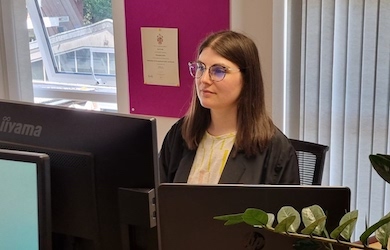In the 8th article in our series on the Baltic States, we take a look at the thriving technology sector in the Baltic States (Estonia, Latvia, and Lithuania).
Bolt, an Estonian Success Story
Traditionally, acquiring a taxi service entails calling a local taxi company on the phone. To an extent, this traditional form of interaction remains. However, if you are located in the UK, the USA, or much of the rest of the world, technology has prevailed, with taxi services also being available at the touch of a button with apps like Uber.
The technological revolution for transportation has also exploded in the EU, and often, it is found that an Estonian company called Bolt prevails. Bolt was founded in August 2013 by Markus Villig, who was only 19 years old at the time, and his 17% stake in the company is now worth $700 million [1]. Arriving at Tallinn Airport last year, one of the first things I noticed was the heavy amount of advertising for Bolt. Bolt works much like Uber, bringing taxi services to the digital world. Not only is it easy to use, it’s also relatively cheap. A journey from the city centre of Vilnius, in Lithuania, to Vilnius International Airport, with an introductory offer, was only 7 euros. Like Uber, Bolt also has its own Uber Eats-style food ordering and delivery platform called Bolt Food.
‘Rather than going toe-to-toe with Uber in developed markets, Bolt began targeting countries like Poland, where initially there was little or no competition….When his local backers urged him to follow every other European startup in trying to crack the U.S. market, Villig launched in South Africa instead, hiring all local staff over Skype, which was Estonia’s pioneering tech unicorn. Many of his South African drivers and their customers didn’t have credit cards or bank accounts, so he fast-tracked cash payments. Revenue from African countries, including South Africa, Nigeria, and Ghana now accounts for a third of Bolt’s business.’ – Kieran Meadows, How This Estonian Startup Beat Uber At Its Own Game, Forbes Daily Briefing.
Online Voting in Estonia and Lithuania to follow?
There are only 17 countries in the world where electronic voting has taken place [2]. However, in the Baltic States, online voting looks promising.
In 2005, Estonia became the first country in the world to allow online voting during general elections [3]. In the 2023 elections, more than half of the total votes were made online [4].
In 2020, the Lithuanian government backed legislation for online voting, but with trials to be carried out with expatriates before it is fully rolled out [5].
Unfortunately, online voting appears less likely to be on the horizon in Latvia, ‘its reliability is questioned by the Latvian Open Technologies Association (LATA), and there also appears to be lukewarm support for adoption of e-voting in the corridors of power’. [6]
Lithuania, a Fintech Hub
Fintech is a combination of the words finance and technology, ‘since the 2010s that the term has become increasingly popular. Especially after the subprime crisis that impacted traditional financial players. It was time to find alternatives. And that’s where these startups appeared. They then multiplied fundraising efforts to offer more modern services’. [7] Companies in the Fintech sector include payment services like Paypal and Revolut and cryptocurrency platforms like Coinbase. Within the EU, Revolut Bank UAB, its European Economic Area subsidiary, is licensed by the Bank of Lithuania.
Lithuania has a thriving Fintech sector. As Invest Lithuania reports [8]:
- 276 Fintechs operate in Lithuania as of the end of 2023.
- 1st in the EU in terms of licensed Fintech companies.
- 3rd in OECD for corporate tax competitiveness.
- 9th globally among the lowest ML/TF [9] risk jurisdictions.
The success of Lithuania’s Fintech sector is in part due to cooperation between the relevant institutions, ‘One of the greatest strengths of the Fintech sector in Lithuania is the unified ecosystem, with cooperation and mutual communication within the sector. The Fintech Hub LT association, as well as the public institution Invest in Lithuania, Bank of Lithuania, Ministry of Finance of the Republic of Lithuania, and other companies are working hand in hand to address the issues faced by the financial sector. After the Bank of Lithuania recognised Fintech as a strategic direction of its activity six years ago, the sector began to move at a faster pace, as the obstacles for market participants to enter larger markets began to decrease.’ [10]
Conclusions
The Baltic States potentially provide a positive environment for future technology focused businesses and democratic processes, as shown by services like Bolt, online voting, and Fintech startups. You can find out more about investment in general and the technology sector in the Baltics here:
Pager Power
Pager Power is a dedicated technical consultancy that has been providing independent guidance and advice regarding solar developments, wind farms, and building developments internationally since 2002. Further details about what we services we can provide can be found here. Pager Power has completed over 1,200 glint and glare assessments, over 1,000 aviation/radar impact assessments, over 500 television and radio reception surveys, and over 500 telecommunications impact assessments.
If you require assistance for one of your projects, please get in touch on our website or call us on +44 (0)1787 319001.
References
[1] https://art19.com/shows/forbes-daily-briefing/episodes/0ead8016-4e81-45e6-8bf6-ae66a7f32500
[2] https://en.wikipedia.org/wiki/Electronic_voting_by_country
[3] http://news.bbc.co.uk/1/hi/world/europe/4343374.stm
[4] https://news.err.ee/1608904730/estonia-sets-new-e-voting-record-at-riigikogu-2023-elections
[5] https://www.lrt.lt/en/news-in-english/19/1190786/lithuanian-government-backs-online-voting-but-with-caveats
[6] https://eng.lsm.lv/article/politics/politics/little-chance-of-e-voting-in-latvian-elections-for-forseeable-future.a499509/
[7] https://datascientest.com/en/all-about-fintech
[8] https://investlithuania.com/report/fintech-report-2023-2024/
[9] Money laundering / terrorist financing
[10] https://www.finextra.com/blogposting/24729/why-lithuanias-fintech-is-booming
Thumbnail image accreditation: Rodion Kutsaiev (2017) on Unsplash.com. Last accessed on 24th April 2024. Available at: https://unsplash.com/photos/person-holding-smartphone-0VGG7cqTwCo



